小学英语特殊疑问句教案
小学英语特殊疑问句教学教案
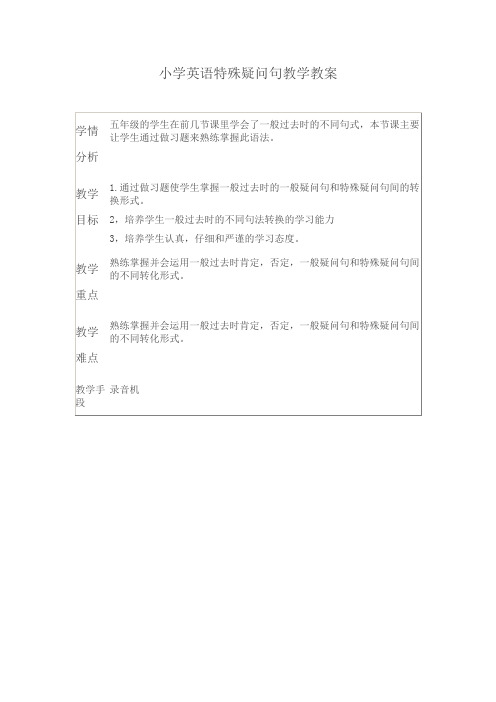
4.注意人称变化。(I变you, we变you, my变your,our变your ). 5.注意句中的some要改为any.
将下列句子变成否定句,再变为一般疑问句,并做肯定和否定回答
1. she can play football well. 2. lingling is twelve years old.
3.在动词前面加助动词don't ,doesn't (三单),didn't(过去式),动词保持原形. 4. 注意句中的some要改为any.
二. 改一般疑问句:(用Yes或No回答)
1.句中有be动词, (is, am, are, was, were)把be动词调到句首,首字母大写.
2.句中有情态动词(can, will, should, would, have got, has got)把情态动词调到句首,首字母大写.
8._____ does Jim play football? He plays football in the afternoon
9._____ does he play? He plays in the park.
10._____ are you from? I'm fromChina.
11. ______ bananas do you want? Six please.
3.We came backlast Sunday. 4.I wantsix bananas.
5.Supermanflies in the sky. 6.We went totheLondonEye.
7.I wantone kilo of cheese. 8.The apple ison the table.
小学英语特殊疑问句精讲

Why +not +行为动词原形+其他?
What a fine day! Why not go to the park and have a picnic there? 天气真好啊!为什么不去公园野餐呢?
Good idea! 好主意!
Because I have a test this week. 因为我这周有个测试。
Why isn’t Tom at home? 汤姆为什么不在家?
Because he goes to have a piano lesson. 因为他去上钢琴课了。
Why引导的特殊疑问句还可以用来向对方提出建议。
1.Why+助动词+(not)+主语+其他? Because+陈述句。
Why does he like pandas? 他为什么喜欢大熊猫?
Because they are very cute. 因为它们很可爱。
Why don’t you go to school with me? 你为什不和我一起去学校?
Because I have got a bad cold. 因为我得了重感冒。
2. Why+情态动词+(not)+主语+其他? Because+陈述句。
Why can Jim get the job? 为什么吉姆能得到这份工作?
Because he is good at English speaking. 因为他英语口语好。
Why句型面面观
疑问词why意思是“为什么”,用来询问原因、理由。
小学英语五年级特殊疑问句
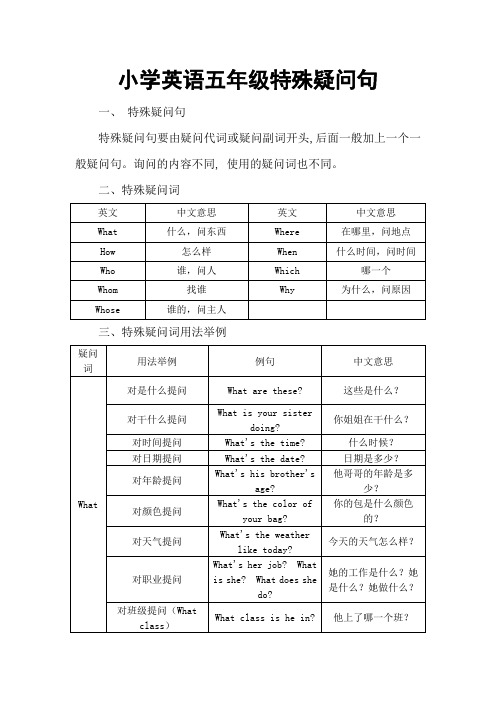
小学英语五年级特殊疑问句一、特殊疑问句特殊疑问句要由疑问代词或疑问副词开头,后面一般加上一个一般疑问句。
询问的内容不同, 使用的疑问词也不同。
二、特殊疑问词三、特殊疑问词用法举例四、疑问词填空练习【牛刀小试】1.( ) do you like?2.( ) many birds do you see?3.( ) is that man?4.( )can you do ?5.—( ) your name?—My name’s Amy.6.—( ) this/that?—It’s a bear!7.—( ) do you like?—I like watermelons.8.—( ) in the classroom?—One blackboard, one TV, many desks and...—It’s blue and white.10.—( )would you like for dinner?—I’d like some beef and noodles.11.—( )your father’s job?—My father is a doctor.12.—( )time is it?—It’s 9 o’clock.13.—( ) the weather like in London?—It's rainy.14.—( ) are these/those?—They are tomatoes.15.—( )are you?—I’m fine. Thank you./ Very well. Thanks. 16.—( )old are you?—I’m twelve years old.17.—( ) many kites do you see/have?—I see/have ten kites.18.—( ) many people are there in your family? —Nine.19.—( ) much is it?—It’s 89 dollars.—I’m from the USA. 21.—( ) is my car?—It’s under the chair. 22.—( )is it?—It’s near the window.’23.—( ) is the library? —It’s on the second floor.24.—( )is that boy?—He is my brother. 25.—( )is he?—He is Zhang Peng. 26.—( )coat is it?—It's your father’s. 27.—( )are these? —They are mine.28.( )is the crayon?—It's in the pencil box. 29.( ) is that girl? ---She is my sister .。
特殊疑问句教案
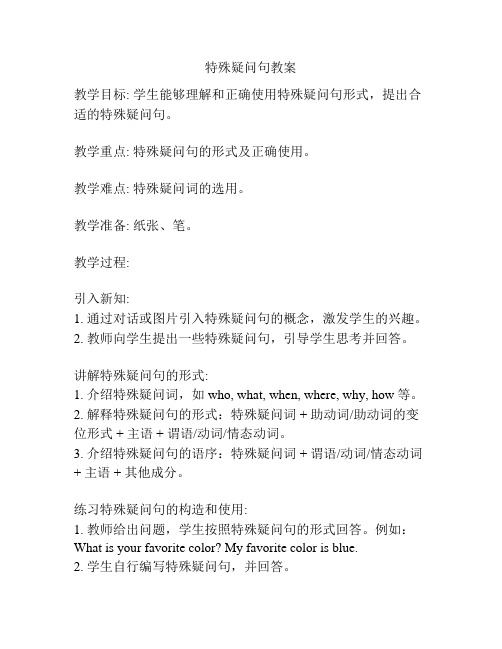
特殊疑问句教案教学目标: 学生能够理解和正确使用特殊疑问句形式,提出合适的特殊疑问句。
教学重点: 特殊疑问句的形式及正确使用。
教学难点: 特殊疑问词的选用。
教学准备: 纸张、笔。
教学过程:引入新知:1. 通过对话或图片引入特殊疑问句的概念,激发学生的兴趣。
2. 教师向学生提出一些特殊疑问句,引导学生思考并回答。
讲解特殊疑问句的形式:1. 介绍特殊疑问词,如who, what, when, where, why, how等。
2. 解释特殊疑问句的形式:特殊疑问词 + 助动词/助动词的变位形式 + 主语 + 谓语/动词/情态动词。
3. 介绍特殊疑问句的语序:特殊疑问词 + 谓语/动词/情态动词+ 主语 + 其他成分。
练习特殊疑问句的构造和使用:1. 教师给出问题,学生按照特殊疑问句的形式回答。
例如:What is your favorite color? My favorite color is blue.2. 学生自行编写特殊疑问句,并回答。
巩固练习:1. 给学生一些句子,让他们改写为特殊疑问句。
例句:They are going to the park tomorrow. -----> When arethey going to the park?2. 给学生一些图片,让他们用特殊疑问句描述图片内容,并互相提问和回答。
3. 学生之间进行小组活动,每个小组选择一个主题,组员之间轮流提出特殊疑问句,其他组员回答。
拓展延伸:1. 教师提供一些情景或故事,让学生根据情境编写特殊疑问句,并与同学分享。
2. 学生可以自行查找资料,编写一段描述某个地方、人物、事件等的特殊疑问句,并展示给全班。
总结梳理:教师带领学生回顾特殊疑问句的形式和用法,并与学生共同总结规律。
课堂反思:教师对本节课的教学情况进行总结,了解学生的学习情况,为下一节课的教学做准备。
小学英语五年级上册第三单元 教案

阶段
1.Ss greet with the T.
2.Sing a song:《Where did you go?》
3.复习动词的过去式:教师以连线的方式考察学生对动词过去式的掌握情况。go send like meet come visit sent liked met visited meet
Ss do the simple dialogue in pairs.
Ss do practice in activities 4.
Ss show the practice in groups.
Practice
T asks the Ss listen and repeat.
Require the students do the dialogue in pairs.
1.学习询问和谈论过去发生事情的词汇、基本句型及答语
2.用句型询问和谈论过去去过哪里、做过什么事情等。
学习
目标
1.全体学生能准确读出并理解:weekend ,museum ,river ,hour ,twenty ,minute.arrive ,mountain ,plantthe British Museum, the London Eye, wheel, wonderful, understand, postcard。
4、掌握对过去活动的陈述及问答。
整合课
0.5
1.能比较准确地用句型交流过去的活动,并能进行问答对话。
2.自主交流过去的活动,描述旅行经历,并能根据他人的描述提问。
学时课教学设计表
学 科
英语
单 元
Module3 Unit 1
备课者
课 型
学时课
课 题
小学英语肯定句否定句一般疑问句和特殊疑问句的详解
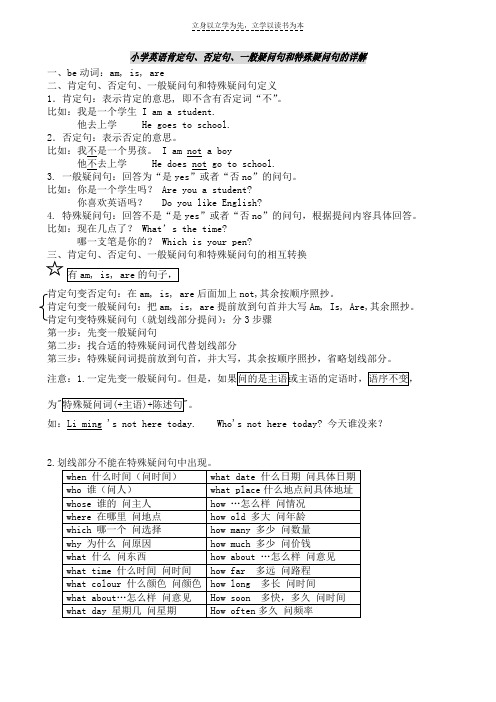
小学英语肯定句、否定句、一般疑问句和特殊疑问句的详解一、be动词:am, is, are二、肯定句、否定句、一般疑问句和特殊疑问句定义1.肯定句:表示肯定的意思, 即不含有否定词“不”。
比如:我是一个学生 I am a student.他去上学 He goes to school.2.否定句:表示否定的意思。
比如:我不是一个男孩。
I am not a boy他不去上学 He does not go to school.3. 一般疑问句:回答为“是yes”或者“否no”的问句。
比如:你是一个学生吗? Are you a student?你喜欢英语吗? Do you like English?4. 特殊疑问句:回答不是“是yes”或者“否no”的问句,根据提问内容具体回答。
比如:现在几点了? What’s the time?哪一支笔是你的? Which is your pen?肯定句变否定句:在am, is, are后面加上not,其余按顺序照抄。
肯定句变一般疑问句:把am, is, are提前放到句首并大写Am, Is, Are,其余照抄。
肯定句变特殊疑问句(就划线部分提问):分3步骤第一步:先变一般疑问句第二步:找合适的特殊疑问词代替划线部分第三步:特殊疑问词提前放到句首,并大写,其余按顺序照抄,省略划线部分。
注意:1.如:Li ming 's not here today. Who's not here today? 今天谁没来?2.例如:1.肯定句、否定句和一般疑问句的互换肯定句:This is a book.否定句:一般疑问句:Is this a book?肯定回答:Yes, it is.否定回答:No, it isn’t.2.就划线部分提问(变特殊疑问句)This is a book.第一步:变一般疑问句 Is this a book?第二步:找合适的特殊疑问词 Is this what ?特殊疑问词提前放到句首,并大写,其余按顺序照抄,省略划线部分。
小学英语特殊疑问句讲解
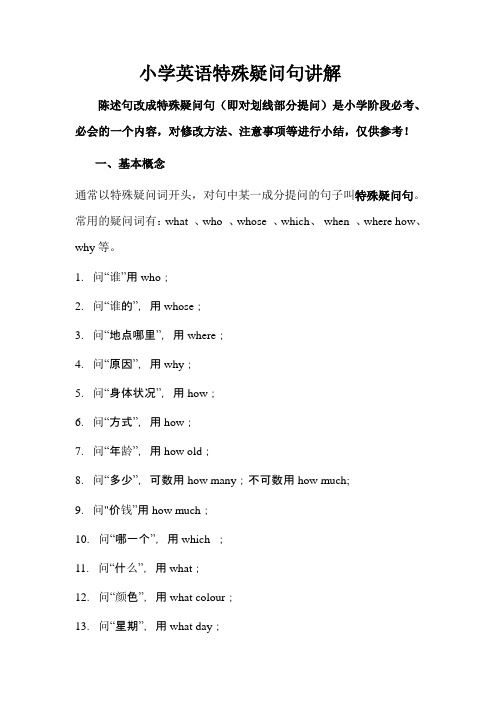
小学英语特殊疑问句讲解陈述句改成特殊疑问句(即对划线部分提问)是小学阶段必考、必会的一个内容,对修改方法、注意事项等进行小结,仅供参考!一、基本概念通常以特殊疑问词开头,对句中某一成分提问的句子叫特殊疑问句。
常用的疑问词有:what 、who 、whose 、which、when 、where how、why等。
1.问“谁”用who;2.问“谁的”,用whose;3.问“地点哪里”,用where;4.问“原因”,用why;5.问“身体状况”,用how;6.问“方式”,用how;7.问“年龄”,用how old;8.问“多少”,可数用how many;不可数用how much;9.问"价钱”用how much;10.问“哪一个”,用which ;11.问“什么”,用what;12.问“颜色”,用what colour;13.问“星期”,用what day;16.问“什么时候”,用when;17.问几点用What’s the time?或What time is it?如果掌握规律,就变得简单多了。
总结一条就是:“特殊疑问词+一般疑问句”,但特殊疑问词的确定要根据划线内容确定,在小学阶段常出现的有以下几种:1.划线部分是“事或物”,特殊疑问词用whatEg: This is a bag. ---What is this?We often play football on Sundays .---What do you often do on Sundays ?2、划线部分是“人”,特殊疑问词用whoEg:She is my sister. ---Who is she ?3、划线部分是“地点”,特殊疑问词用whereEg:The apple is on the desk.---Where is the apple ?4、划线部分是“时间”,特殊疑问词用what time或when Eg:It's six thirty . ---What time is it ?I usually get up at six forty .--- When do you usually get up?5、划线部分是“年龄”,特殊疑问词用how oldEg:I am twelve . ---How old are you?My mother is thirty- two . ---How old is your mother ?6、划线部分是“职业”,特殊疑问词用whatEg:Tom is a worker. ---What is Tom?/What do you do ?7、7、划线部分是“颜色”,特殊疑问词用what colourEg:My hat is blue . ---What colour is your hat?8、划线部分是“数量”,特殊疑问词用how many或how much Eg:I can see five birds in the tree.---How many birds can you see ?There is some tea in the cup.---How much tea is there in the cup ?9、划线部分是“多少钱”,特殊疑问词用how muchEg:This book is ten yuan . ---How much is this book ?10、划线部分是“形容词性物主代词或名词性物主代词”,特殊疑问词用whoseEg:That is my shirt . ---Whose shirt is that ?二、小学英语对划线部分提问答题口诀:一代(用疑问词代替划线部分),二移(把疑问词移至句首),三找(找is , are ,can,would)抄在疑问词后,没有则用do,does(用于主语是第三人称),出现I am 则直接改为Are you),四抄(照抄其它部分)五改(出现some,要考虑是否改为any。
小学英语特殊疑问句教案

小学英语特殊疑问句教案课题特殊疑问句教学目标 1.特殊疑问句的结构2.特殊疑问词的运用教学步骤及教学内容教学过程:一、教学衔接(课前环节)1、上节课的课后练习讲解2、捕捉学生的思想动态和了解学生学习内容教学内容定义:通过疑问词对时间、地点、人物、事件等特定条件提问的一种句型。
疑问句分类:人物:Who?谁Whose?谁的时间:When?什么时候Whattime?几点Whatday?星期几地点:where?哪里事件:what?什么Whatcolor?什么颜色whatnumber?多少号Whatfruit?什么水果选择:which?哪一个方法:how?怎么?怎么样?其他:howmany?多少Howmuch?多少钱Howold?多大Howoften?多少次Howabout?关于。
怎么样?3.疑问词的使用知识总结知识、方法·技能四、知识的延伸和拓展(变式训练)五、布置作业一、教学衔接(课前环节)1、上节课的课后练习讲解2、捕捉学生的思想动态和了解学生学习内容二、教学内容1、定义:通过疑问词对时间、地点、人物、事件等特定条件提问的一种句型特殊疑问词的用法意思用法例句 who 谁问人的身份,姓名等 HeisLiLieWhoishe?Heismybrother.Whoishe? whom 谁问人的身份,姓名等(问宾语) Icanaskhimthequestion.Whomcanyouaskthequestion? what 什么问人的职业或事物是什么 Heisaworker.Whatishe? Hehasabook.Whatdoeshehave? which 哪一个问一定范围内特指的人或物Thebigboxismine.Whichboxisyours?ThegirlatthedoorisAnn.WhichgirlisAnn? whose 谁的问所属关系Thisisherbook.Whosebookisthis?Thisbookishers.Whoseisthisbook? whatcolor 什么颜色问颜色(表语)Myskirtisred.Whatcolorisyourskirt? Whattime 几点问点时间Weplaygamesatfiveintheafternoon?Whattimedoyouplaygames? when 什么时候问时间 Weplaygamesintheafternoon? Whendoyouplaygames? where 什么地方问地点(状语) WeplaygamesathomeonSunday? WheredoyouplaygamesonSunday? why 为什么问原因 Heisn''tatschooltodaybecauseheisill. Whyisn''theatschooltoday? how 怎样问健康状况、做事的方式等 Heisfine/strong.Howishe?Igohomebybike.Howdoyougohome? howold 多大几岁问年龄 Heisten.Howoldishe? howmany 多少跟复数名词,问数量 Therearethirtyboysinmyclass.Howmanyboysarethereinyourclass? howmuch 多少跟不可数名词问数量或价钱 Thereissomemilkinthebottle.Howmuchmilkisthereinthebottle? howfar 多远问路程 It''sfivekilometersawayfromhere? Howfarisitfromhere? howsoon 多久问in+一段时间 Hecanfinishitinhalfanhour. Howsooncanhefinishit? howlong 多久问一段时间,问物体的长短 Hehaslivedhereforayear.Howlonghashelivedhere?Thedeskisonemeterslong.Howlongisthedesk? howoften 多久(一次)问频率 Igotoseemyparentsonceamonth. Howoftendoyougotoseeyourparents?对划线部分进行提问:除了要注意选择正确的疑问词外,还要注意语序的运用对句子的主语提问,其语序是:疑问词+谓语+其他成分?(整个句子是陈述句语序)Sheistheirteacher.Whoistheirteacher?主语谓语主语谓语2、对句子主语的定语部分提问,其语序是:疑问词+主语(即定语所修饰的名词)+谓语+其他成分?(整个句子是陈述句语序)Mybookisoverthere.Whosebookisoverthere?主语的定语主语谓语疑问词主语谓语以上两点方法都是:用争取的疑问词代替划线部分,再把句号改为问号,其余部分一般不做改变3.对表语或宾语的定语部分提问,其语序是:疑问词+表语或宾语(划线部分所修饰的名词)+一般疑问句(省略划线部分和它所修饰的名词)I''mlookingformywatch..Whosewatchareyoulookingfor?宾语的定语宾语疑问词宾语一般疑问句(省略掉mywatch)对表语、宾语或状语提问,其语序是:疑问词+一般疑问句(省略划线部分)HelivesinBeijing.Wheredoeshelive?状语疑问词一般疑问句(省略掉画线部分inBeijing)对谓语和宾语提问,其语序是:疑问句(what)+一般疑问句(其中谓语动词要用do的相对应形式代替:省略宾语。
- 1、下载文档前请自行甄别文档内容的完整性,平台不提供额外的编辑、内容补充、找答案等附加服务。
- 2、"仅部分预览"的文档,不可在线预览部分如存在完整性等问题,可反馈申请退款(可完整预览的文档不适用该条件!)。
- 3、如文档侵犯您的权益,请联系客服反馈,我们会尽快为您处理(人工客服工作时间:9:00-18:30)。
龙文教育教师1对1个性化教案学生姓名杜韵琪教师姓名万智华授课日期授课时段课题特殊疑问句教学目标1.特殊疑问句的结构2. 特殊疑问词的运用教学步骤及教学内容教学过程:一、教学衔接(课前环节)1、上节课的课后练习讲解2、捕捉学生的思想动态和了解学生学习内容二、教学内容1.定义:通过疑问词对时间、地点、人物、事件等特定条件提问的一种句型。
2.疑问句分类:人物:Who? 谁Whose? 谁的时间:When?什么时候What time?几点What day?星期几地点:where?哪里事件:what?什么What color?什么颜色what number?多少号What fruit?什么水果选择:which?哪一个方法:how?怎么?怎么样?其他:how many?多少How much?多少钱How old?多大How often?多少次How about?关于。
怎么样?3.疑问词的使用三、知识总结知识、方法·技能四、知识的延伸和拓展(变式训练)五、布置作业教导处签字:日期:年月日六、目标完成情况0~30% 〇31%~50% 〇51%~75% 〇76%~80% 〇81%~90% 〇91%~100% 〇教学过程中学生易错点归类作业布置学习过程评价学生对于本次课的评价O 特别满意O 满意O 一般O 差教师评定学生上次作业评价O好O较好O 一般O差学生本次上课情况评价O 好O 较好O 一般O 差家长意见家长签名:一、教学衔接(课前环节)1、上节课的课后练习讲解2、捕捉学生的思想动态和了解学生学习内容二、教学内容1、定义:通过疑问词对时间、地点、人物、事件等特定条件提问的一种句型特殊疑问词的用法意思用法例句who 谁问人的身份,姓名等He is LiLie Who is he ? He is my brother.Who is he ?whom 谁问人的身份,姓名等(问宾语)I can ask him the question. Whom can you ask the question?what 什么问人的职业或事物是什么He is a worker.What is he?He has a book. What does he have ?which 哪一个问一定范围内特指的人或物The big box is mine. Which box is yours?The girl at the door is Ann. Which girl is Ann?whose 谁的问所属关系This is her book.Whose book isthis ?This book is hers. Whose is thisbook?what color 什么颜色问颜色(表语)My skirt is red. What color is yourskirt?What time 几点问点时间We play games at five in theafternoon ?What time do you play games?when 什么时候问时间We play games in the afternoon ?When do you play games?where 什么地方问地点(状语)We play games at home on Sunday ?Where do you play games on Sunday? why 为什么问原因He isn't at school today because he isill.Why isn't he at school today ?how 怎样问健康状况、做事的方式等He is fine/strong. How is he ?I go home by bike. How do you go home?how old 多大几岁问年龄He is ten.How old is he ?how many 多少跟复数名词,问数量There are thirty boys in my class.How many boys are there in yourclass?how much 多少跟不可数名词问数量或价钱There is some milk in the bottle.How much milk is there in the bottle?how far 多远问路程It's five kilometers away from here?How far is it from here?how soon 多久问in+一段时间He can finish it in half an hour.How soon can he finish it ?how long 多久问一段时间,问物体的长短He has lived here for a year. How long has he lived here? The desk is one meters long. How long is the desk ?how often 多久(一次)问频率I go to see my parents once a month.How often do you go to see yourparents?1.对划线部分进行提问:除了要注意选择正确的疑问词外,还要注意语序的运用1、对句子的主语提问,其语序是:疑问词+谓语+其他成分?(整个句子是陈述句语序)She is their teacher. Who is their teacher?主语谓语主语谓语2、对句子主语的定语部分提问,其语序是:疑问词+主语(即定语所修饰的名词)+谓语+其他成分?(整个句子是陈述句语序)My book is over there. Whose book is over there ?主语的定语主语谓语疑问词主语谓语以上两点方法都是:用争取的疑问词代替划线部分,再把句号改为问号,其余部分一般不做改变3.对表语或宾语的定语部分提问,其语序是:疑问词+表语或宾语(划线部分所修饰的名词)+一般疑问句(省略划线部分和它所修饰的名词)I'm looking for my watch.. Whose watch are you looking for ?宾语的定语宾语疑问词宾语一般疑问句(省略掉my watch)4、对表语、宾语或状语提问,其语序是:疑问词+一般疑问句(省略划线部分)He lives in Beijing . Where does he live ?状语疑问词一般疑问句(省略掉画线部分in Beijing )5、对谓语和宾语提问,其语序是:疑问句(what)+一般疑问句(其中谓语动词要用do的相对应形式代替:省略宾语。
He watches TV in the evening What does he do in the evening?He watched TV yesterday evening. He is watching TV now.He was watching TV at that time?. He is going to watch TV this evening.三、教学课后练习I.对画线部分提问、1.They bought a new bike yesterday.____________________________________________________2.She is a nurse .____________________________________________________3.She is my teacher.____________________________________________________4.He bought the red one .____________________________________________________5.It is my coat .____________________________________________________ 6.I am looking for my sister .____________________________________________________ 7.I get up at six .____________________________________________________ 8.I am from Hubei .____________________________________________________ 9.I went to school late because I got up late.____________________________________________________ 10. It is windy ._____________________________________________________ 11. I am getting on well with it._____________________________________________________ 12. My bag is red .______________________________________________________ 13. The book is Li Hua’s.______________________________________________________ 14. I like math best.______________________________________________________ 15. They are five yuan .______________________________________________________ 16. I wash it twice a week .______________________________________________________17. He will be back in four days .______________________________________________________18. I didn’t come to class yesterday because I was ill .______________________________________________________II.选择题( ) 19. Excuse me ______ is the nearest bookshop ?Go down the street and turn left at the second corner?A. howB. whatC. whereD. who( ) 20. ______ is a ticker for the film Hacker He?About forty yuan .A. How oldB. How manyC. How muchD. How often ( ) 21. —______ are you going? —I’m going to the library.A. WhoB. WhichC. WhatD. Where( ) 22. It’s a nice car. ______ have you been in it?Just to Shanghai.A. How muchB. How soonC. How longD. How far ( ) 23. ______? It’s eight.A. What day is itB. What’s five and threeC. How old are youD. What’s your telephone number ( ) 24. —______? —I’ve got a headache and a cough.A. What’s your troubleB. What’s wrong with itC. Can I help youD. How are you( ) 25. ______ tea did you have?。
